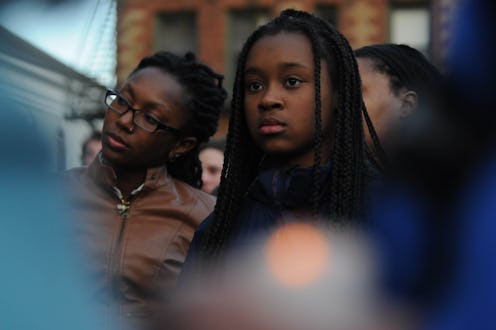Life
Black Families In Boston Have Just $8 In Wealth On Average, According To This New Report

Black Bostonians are struggling economically, a new report from the Boston Globe has found. While white households in the Boston area have a median net worth of $247,500, according to data from the Federal Reserve of Boston, Black families in the same area have just $8 in wealth on average. That makes white households 31,000 times wealthier than their Black counterparts. The discrepancy was so stark that the Boston Globe even had to publish another article saying it wasn't a typo. Despite being considered a liberal hub, Boston still struggles with issues of racism that are both interpersonal and institutional. Like many cities in America, racism in Boston isn’t as overt as it was 50 years ago, when racial tension boiled over during the Roxbury Riots, but its negative effects on Black people’s wealth, educational attainment, and political power are clear.
The Globe commissioned a national survey earlier this year in which 54 percent of Black people ranked Boston as the city that's least welcoming to people of color in the United States. The second least-welcoming city —Charlotte, NC — trailed Boston by 16 percentage points, according to the survey. Additionally, a Suffolk University/Boston Globe poll completed this summer found that nearly two-thirds of Black Bostonians said they were treated unfairly due to their race in the previous month.
The Boston area is known for its prestigious institutions of higher learning, but Black students aren’t a common sight at these schools. The percentage of Black students enrolled in top universities in and around Boston remains in the single digits, a negligible increase from over three decades ago, according to the Globe. Education is often portrayed as a pathway to a higher socioeconomic class, but if Black students aren't in these classrooms, their chances of earning higher wages diminish.
In 1983, Globe reporters took an in-depth look at race in Boston, and 34 years later, they found that not much has improved. In the ‘80s, Boston’s unemployment rate was about twice as high for Black people as it was for whites, and in 2014, the gap remained, with Black unemployment more than double the rate of white workers.
The Black Bostonians who are employed still do not receive equal pay; income disparities are also a problem for Boston’s Black community. According to the American Community Survey, the median income for white households was $68,162 in 2011, while the income for Black households was only $37,974.
According to the Globe's report, there has only been one Black president of the city council in the last 50 years, and less political representation is worrisome to the Black community. A Pew Research study found that nearly 40 percent of Black people say that working to get more Black people elected to office would be a very effective tactic for groups striving to help blacks achieve equality.
Racism is more than racial slurs and disliking someone because of the color of their skin. Racism is also denying Black people equal opportunities to succeed socially, economically, and politically.
When asked to describe what it's like live in Boston as a Black person, Reddit user _Neoshade_ described it like this: "The truth of it is that there are two Bostons — the working-class generational neighborhoods and surrounding towns, and the young, progressive ones. Most 'Boston' movies show the working class neighborhoods with the thick accents. Racism is alive and well in some of these areas, and there are housing projects and depressed, largely Black neighborhoods in Boston itself. The other side of Boston is highly educated, young, diverse, and driving up real estate prices with double income households in research, education, healthcare, and technology fields."
Other cities in the United States have racial wealth and income disparities, but Boston's stood out. In Washington D.C., the median white family has 81 times as much wealth as the median Black family, according to the Atlantic, and in Los Angeles, the median wealth for whites is 89 times higher.
The Black experience stands out in Boston due to the degree of the disparities, but it definitely isn't the only city in which Black people are grappling with the daily effects of institutional racism. Black people cannot simply pull themselves up out of institutionalized racism; viable policy solutions are needed to close wealth and income gaps across the country.